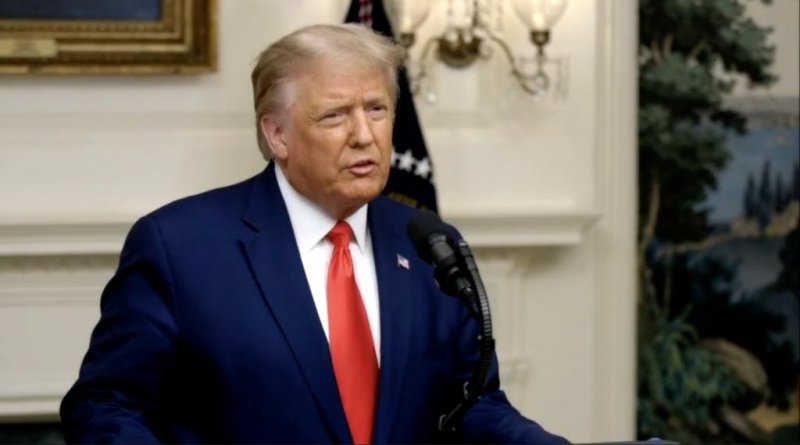President Donald Trump delivers a recorded address Tuesday at the 75th General Debate of the United Nations General Assembly. Photo courtesy of the United Nations
Sept. 22 (UPI) -- In a recorded address Tuesday at the 75th U.N. General Assembly, U.S. President Donald Trump slammed China for its response to COVID-19 in the early weeks of the pandemic.
Trump's taped remarks were broadcast on the first day of the assembly's General Debate, along with recorded addresses from other global leaders.
"The Chinese government and the World Health Organization, which is virtually controlled by China, falsely declared that there was no evidence of human-to-human transmission," Trump said. "The United Nations must hold China accountable for their actions."
China's U.N. ambassador, Zhang Jun, said his country's leadership "resolutely rejects the baseless accusations against China. Zhang introduced Chinese President Xi Jinping's pre-recorded statement to the U.N. General Assembly.
"The world is at a crossroads. At this moment, the world needs more solidarity and cooperation, but not confrontation," Zhang said.
Again calling it the "China virus," Trump declared that the world's nations will "defeat" the pandemic and touted his administration's record in fighting the virus on a day when the U.S. death toll topped 200,000.
The General Assembly is the first since Trump decided earlier this year to withdraw from WHO, the chief U.N. health agency.
Xi called for global cooperation to defeat the pandemic and appeared to offer a less divisive tone than Trump.
"We will continue to narrow differences and resolve disputes with others through dialogue and negotiation," Xi said. "We will not seek to develop only ourselves or engage in zero sum game.
This year's debate, like many other high-profile events in the COVID-19 era, will largely be held remotely.
Preceding Trump's address, U.N. Secretary-General Antonio Guterres warned that the worsening relations between the United States and China hold the potential for a "new cold war."
"We are moving in a very dangerous direction," he said. "Our world cannot afford a future where the two largest economies split the globe in a great fracture -- each with its own trade and financial rules and Internet and artificial intelligence capacities."
Brazilian President Jair Bolsonaro and Turkish President Recep Tayyip Erdogan each delivered taped addresses immediately following Trump.
Bolsonaro defended his government's record in protecting the Amazon rainforest, claiming his administration is the victim of "a brutal disinformation campaign."
The Brazilian leader said the true goal of environmentalists is to "harm the government and Brazil itself."
The remarks came as a record number of fires burned through the Pantanal, the world's largest tropical wetlands.
Erdogan called for "comprehensive and meaningful reforms" at the United Nations, including a restructuring to expand the Security Council beyond the five permanent, veto-holding members -- the United States, Britain, China, France and Russia.
The COVID-19 pandemic has shown "how ineffective" the Security Council is set up, he said.
"Thus, we have once again seen the rightfulness of the 'the world is bigger than five' thesis, which I have been advocating for years from this rostrum."
Russian President Vladimir Putin, in his address, called for stronger cooperation with WHO and promised his country's newly developed COVID-19 vaccine was safe and effective.
"We are proposing to hold an online high-level conference shortly for countries interested in cooperation in the development of anti-coronavirus vaccines," he said.
"We are ready to share experience and continue cooperating with all states and international entities, including in supplying the Russian vaccine, which has proved reliable, safe and effective, to other countries."
Iranian President Hassan Rouhani focused much of his speech on his country's nuclear ambitions, rebuking the United States' decision to withdraw from the Joint Comprehensive Plan of Action nuclear deal and reimpose sanctions on Iran.
"Iran is not a bargaining chip in U.S. elections and domestic policy," Rouhani said. "Any U.S. administration after the upcoming elections will have no choice but to surrender to the resilience of the Iranian nation.
Others scheduled to give remarks in Tuesday's early session were South Korean President Moon Jae-in and French President Emmanuel Macron.
In all, 170 heads of state and government leaders will take part in the General Debate this week -- the most ever for the event. However, most will not travel to the U.N. headquarters in New York City amid 14-day quarantine regulations due to the pandemic.
U.N. spokesman Stephan Dujarric estimated that about 200 people will be present in the hall during the speeches -- diplomats from all member states who will introduce the pre-recorded speeches.















